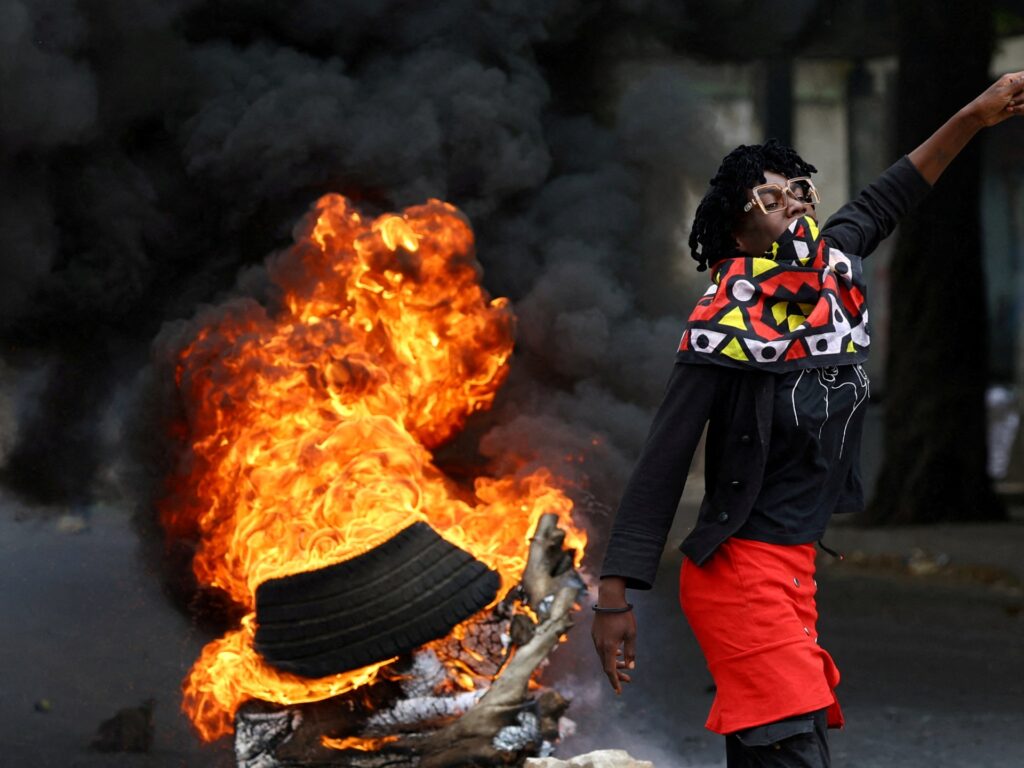The African nation has been rocked by violence since its October 9 vote, won by the Frelimo party, which has been in power for almost 50 years.
Police in Mozambique have fired tear gas in the capital Maputo to disperse people protesting against the government over alleged fraud in last month’s elections.
The demonstration on Thursday was the biggest yet against the governing Frelimo party, which was declared the winner of the October 9 election, extending its 49-year rule.
Large crowds of mostly young men barricaded streets with burning tyres and waved homemade signs in support of opposition leader Venancio Mondlane, who says the vote was rigged and had called for a week of protests culminating on Thursday.
As the protesters marched towards the city centre, police tried to stop them by using tear gas.
In an interview with AFP news agency, Mondlane, who claims to be the actual winner of the election, said it was a “crucial moment” for the country.
“I feel that there is a revolutionary atmosphere … that shows that we are on the verge of a unique historical and political transition in the country,” said Mondlane, speaking from an undisclosed location.
The 50-year-old former radio presenter said he could not disclose his whereabouts other than to say he was not in Africa. He left Mozambique last month following the unrest. He initially said he would be at Thursday’s march, but on Wednesday told AFP he wouldn’t return after all due to safety concerns.
The Mozambique Bar Association on Thursday warned there were “conditions for a bloodbath” as a heavy security presence was seen deployed across the capital.
“The approach of the police has been to try to stop the demonstrations by using tear gas and other weapons, and they have used live gunfire over the last two weeks on several occasions,” said Al Jazeera’s Malcolm Webb, reporting from Maputo, as burning roadblocks and smoke could be seen behind him.
“The police have said that protests are allowed and will be allowed to proceed as long as they are peaceful, but it seems even people marching peacefully have been violently dispersed,” Webb added.
Amnesty International says at least 20 people have been killed in protests since the election – a figure that the local NGO the Centre for Democracy and Human Rights puts at 24.
A police officer was also killed in a protest over the weekend, Defence Minister Cristovao Chume told reporters on Tuesday, warning the army could intervene “to protect the interests of the state”.
“There is an intention to change the democratically established power,” said Chume.
President Filipe Nyusi is expected to step down early next year at the end of his two-term limit and hand over power to Frelimo’s Daniel Chapo, who won the presidential election with 71 percent of the vote, according to the National Electoral Commission.
Mondlane, who has lodged a case at the Constitutional Council to request a ballot recount, told AFP he was “open to a government of national unity”.
The authorities have restricted internet access across the country, in what Human Rights Watch calls an effort to “suppress peaceful protests and public criticism of the government”.
United Nations High Commissioner for Human Rights Volker Turk has also warned against “unnecessary or disproportionate force”, saying police should “ensure that they manage protests in line with Mozambique’s international human rights obligations”.
The Southern African Development Community has called for an extraordinary summit between November 16 and November 20 in part to discuss developments in Mozambique.
Meanwhile, South Africa closed its border with Mozambique shortly after opening it on Thursday. Authorities also warned South Africans to postpone non-essential visits to the neighbouring country.
Read the full article here
